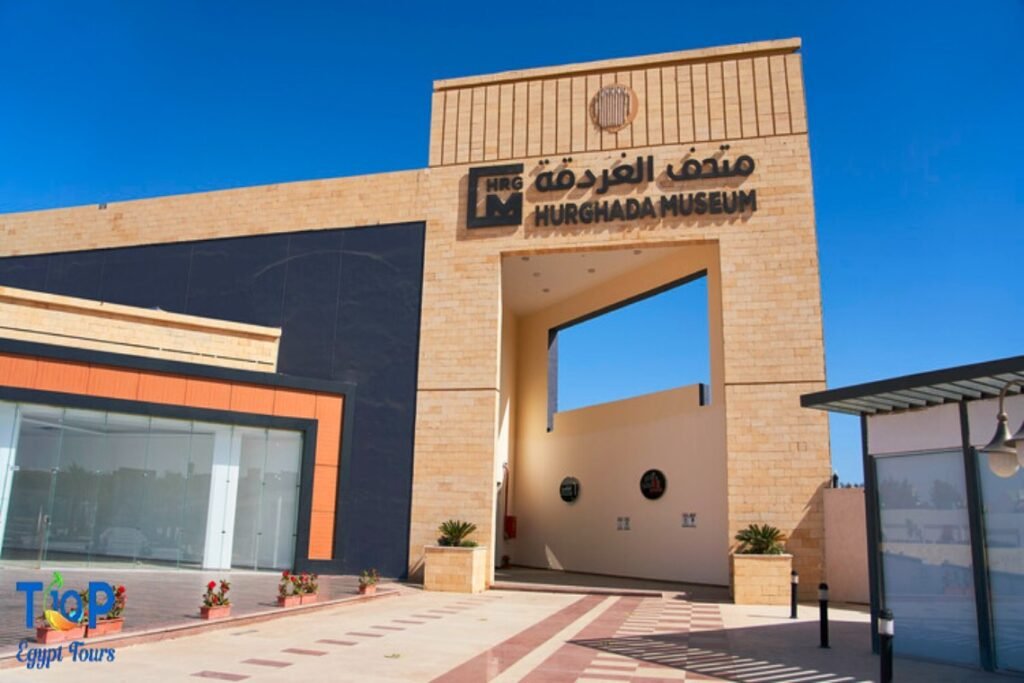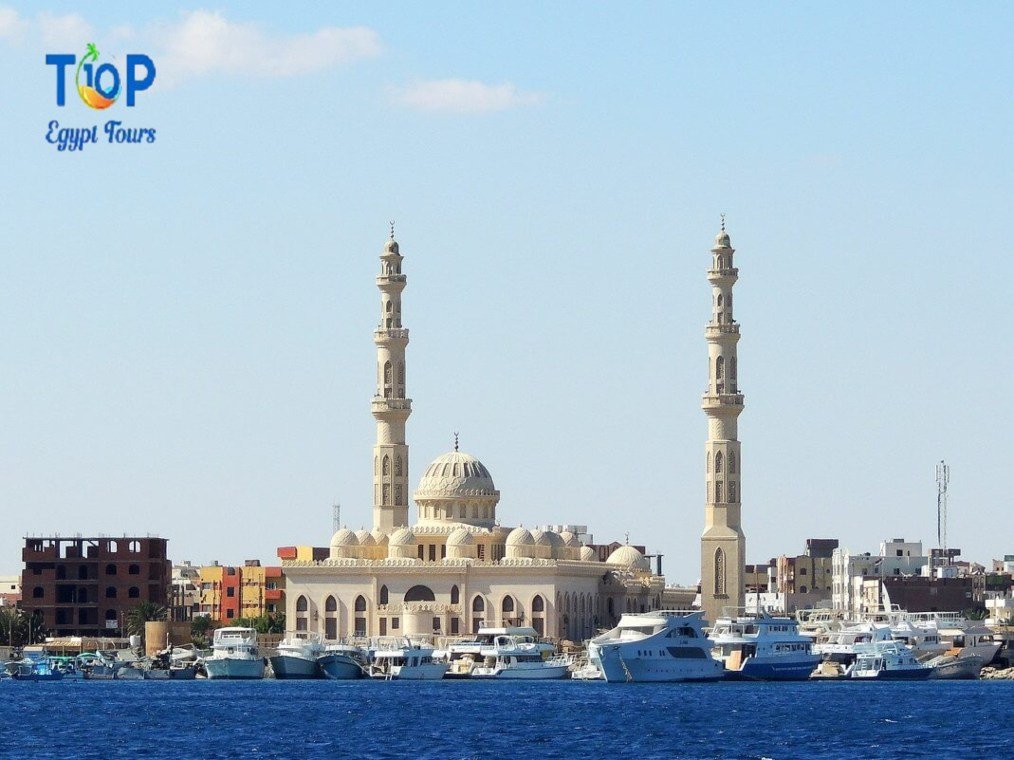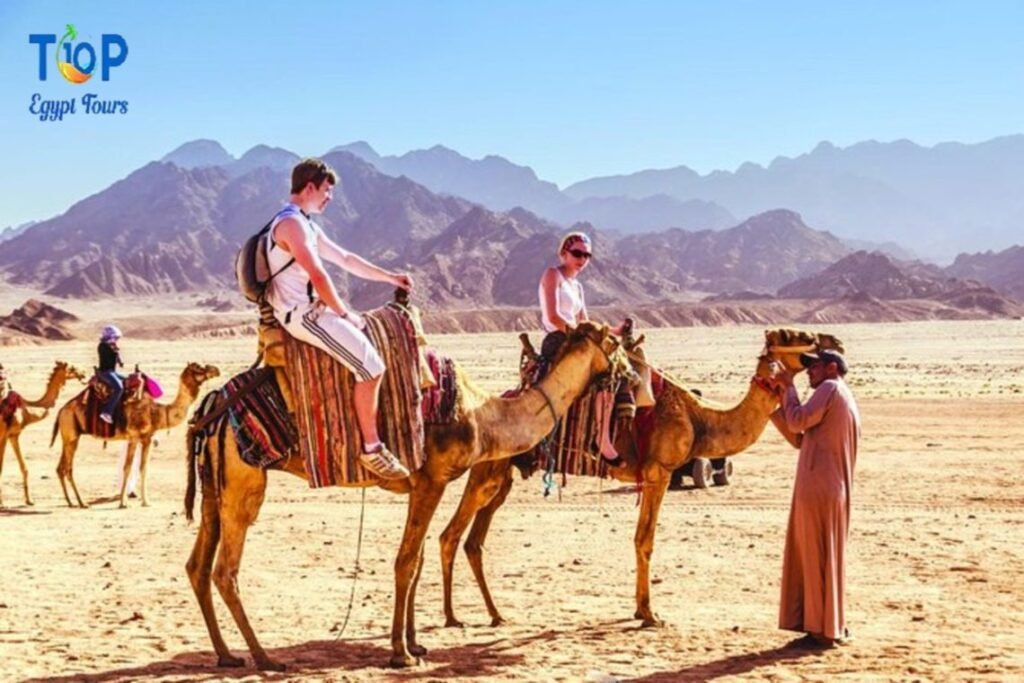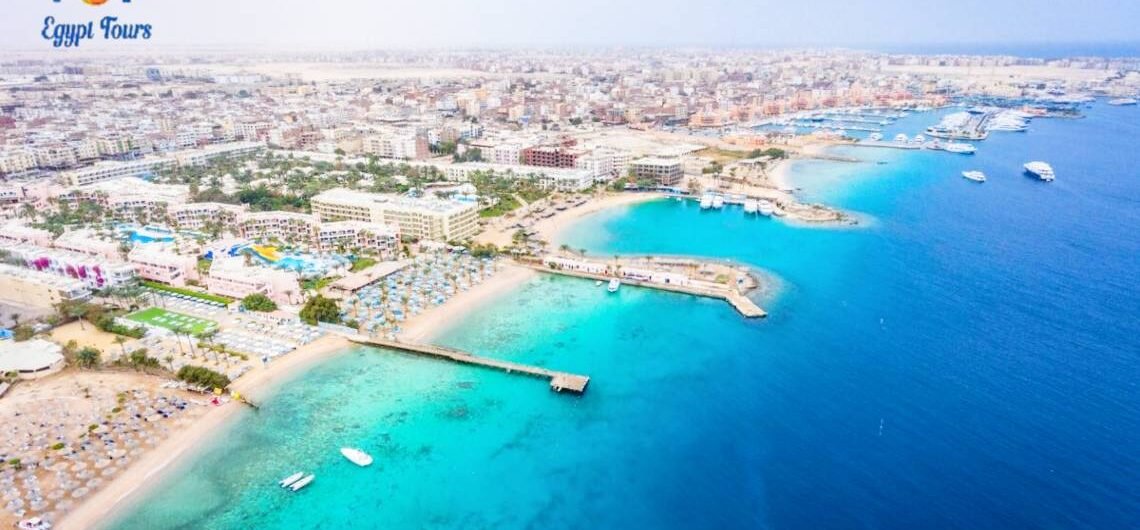Hurghada City Attractions, Discover the rich history, culture, and attractions of Hurghada City, Egypt. From ancient landmarks to modern experiences, uncover everything you need to know.
In this article, we will uncover for you the Hurghada City Attractions with Top Ten Egypt Tours.
Introduction
Hurghada, a vibrant resort town located on the Red Sea coast of Egypt, is renowned for its stunning beaches, Underwater Of The Red Sea, and a plethora of recreational activities that make it a prime destination for tourists. Initially established as a small fishing village, Hurghada has evolved into a bustling hub of tourism, attracting visitors from around the globe. Its significance in Egypt’s history and culture continues to grow, as it offers a unique blend of historical intrigue, modern development, and natural beauty.

The city’s geographical location along the Red Sea has not only made it a gateway to magnificent coral reefs and marine life but also a starting point for excursions to nearby historical sites such as Luxor and the Valley of the Kings. Hurghada’s coastal charm is complemented by its rich cultural experiences, ranging from traditional marketplaces to contemporary art galleries.
In this comprehensive guide, we’ll delve into the myriad attractions that Hurghada has to offer—from breathtaking natural wonders to cultural landmarks, dining experiences, and more. Whether you are seeking adventure, relaxation, or a taste of Egyptian history, Hurghada promises an unforgettable experience.
Table of Contents
- Introduction to Hurghada City Attractions
- Historical Significance
- Top Attractions
- Cultural Experiences
- Modern Hurghada
- Dining and Cuisine
- Shopping Spots
- Outdoor Activities
- Seasonal Travel Tips
- Getting Around the City
- Where to Stay
- FAQs
- Final Thoughts
Section 1: Introduction to Hurghada City Attractions
Hurghada, situated on the eastern coast of Egypt, boasts a strategic location along the Red Sea, which is famous for its diverse marine ecosystems In The Red Sea(Read More). With an average of 365 days of sunshine per year, it is a year-round destination that attracts sun-seekers, divers, and those looking for a relaxing vacation. The city experiences a hot desert climate, which makes its temperate winter months the most suitable for visiting.

Historically, Hurghada was a modest fishing village until the 1980s when it began to develop into one of the country’s leading tourist hubs. The local economy transformed dramatically with the influx of tourists, leading to an expansion of hotels, restaurants, and leisure activities. Today, Hurghada not only offers beautiful beachfront resorts but also significant historical and cultural attractions.
The city is a melting pot of various cultures, where Egyptian traditions meld seamlessly with influences from Europe and beyond. This diverse cultural identity can be seen in local festivals, art, and culinary offerings, making it a unique destination for travelers. The vibrancy of the Red Sea lifestyle, accompanied by the warmth of Egyptian hospitality, sets Hurghada apart as a prime location for both relaxation and exploration.
As visitors immerse themselves in the attractions of Hurghada, they will find opportunities for both adventure and cultural enrichment. The city’s unique offerings range from historic relics in nearby areas to modern entertainment options like water parks and nightlife, ensuring there is something for everyone.
Section 2: Historical Significance Of Hurghada City Attractions
While Hurghada itself is primarily known today as a resort town, its historical significance is underscored by the rich cultural and historical tapestries of the surrounding regions. The history of Hurghada dates back to ancient times when it served as a small fishing community. It became more prominent in the 20th century, particularly in the 1980s, when tourism began to shape its identity.
Interestingly, the history of the Red Sea plays a vital role in the maritime routes of ancient civilizations. The nearby regions of Luxor and Karnak, steeped in pharaonic history, are only a few hours away and have always influenced the dynamics of trade and culture in Hurghada. Visitors often take excursions from Hurghada to these historical sites, discovering the grandeur of Egypt’s ancient civilization.
Today, Hurghada has several historical markers that attract visitors interested in Egypt’s rich past. The nearby islands of Giftun and Paradise offer archaeological sites and remnants that date back to earlier civilizations. Moreover, local museums such as the Hurghada Museum, which opened recently, provide insights into the city’s evolution from a fishing village to a major tourist destination.

Moreover, Hurghada City Attractions is also impacted by modern developments that tell the story of Egypt in recent decades. The rapid construction of hotels, housing, and tourist facilities is a testament to the country’s focus on tourism as an economic pillar. This blend of the ancient and modern provides rich material for understanding Egypt’s past and present.
In summary, while Hurghada may not boast the same level of ancient architecture as cities like Cairo or Luxor, its historical significance lies in its strategic location as a gateway to some of Egypt’s greatest treasures, along with its own unique evolution into a major tourist hub.
Section 3: Top Hurghada City Attractions
Hurghada is home to a variety of attractions that cater to diverse interests. Here are some of the top must-visit landmarks and sites that epitomize the essence of this vibrant city:
- Giftun Island: Located just off the coast of Hurghada, Giftun Island is a breathtaking natural reserve known for its pristine beaches and vibrant coral reefs. Visitors can partake in snorkeling and diving excursions to explore the underwater world, where schools of colorful fish and stunning coral formations await.
- Hurghada Marina: This bustling marina is a hotspot for dining, shopping, and nightlife. With a variety of cafes, restaurants, and boutiques, it’s the perfect place to stroll along the waterfront, enjoy a meal, or indulge in some people-watching.
- Diving and Snorkeling Spots: Some of the world’s most celebrated dive sites are found near Hurghada, including the famous Abu Ramada and the Brother Islands. Divers can experience the rich marine biodiversity, including turtles, dolphins, and a spectrum of exotic fish.
- Hurghada Grand Aquarium: A family-friendly attraction, the Hurghada Grand Aquarium showcases the fascinating marine life of the Red Sea through its impressive displays and interactive activities, including a glass-bottom boat ride that allows visitors to observe ecosystems without getting wet.
- Desert Safari: For those looking for adventure, exploring the Eastern Desert on a quad bike or jeep safari is a thrilling way to experience the unique landscapes, with opportunities to visit traditional Bedouin camps and learn about Bedouin Culture.
- El Dahar District: Known as the old town of Hurghada, El Dahar offers a glimpse into local life with its traditional markets (souks) and authentic Egyptian atmosphere. Here, visitors can shop for handicrafts, spices, and souvenirs.
- Mosque El Mina: This stunning mosque is an architectural gem in Hurghada, welcoming visitors to explore its beautiful interiors and capture stunning photographs of its intricate details.

Additionally, as guests venture beyond the city, excursions to nearby historical landmarks, such as the temples of Karnak and Luxor, are often included in guided tours, making Hurghada an ideal base for a comprehensive Egyptian experience.
Section 4: Cultural Experiences Of Hurghada City Attractions
Hurghada is not only about sun and sand; it is a vibrant multicultural destination that offers visitors a range of cultural experiences. Here are some highlights:
- Local Festivals: Throughout the year, Hurghada hosts various festivals that celebrate its rich culture. The annual El Gouna International Film Festival attracts filmmakers and cinema lovers alike, showcasing Egyptian and international films. Other cultural festivals celebrate traditional music and dance, allowing tourists to immerse themselves in the local identity.
- Art and Music Scene: The city is home to a burgeoning art scene that reflects both traditional and contemporary influences. Local galleries exhibit works from Egyptian artists, and there are plenty of live music venues featuring traditional Egyptian music, particularly during the evenings.
- Cuisine and Culinary Tours: Food is an integral part of Egyptian culture, and Hurghada offers various culinary experiences that let visitors savor local dishes. Culinary tours often include visits to local markets where spices and fresh ingredients are on display. Dining at traditional restaurants is an adventure in itself, as tourists can try dishes like koshari (a mix of rice, pasta, lentils, and spices), grilled seafood, and various meze.
- Cultural Workshops: Tourists can participate in workshops that teach traditional crafts such as pottery and jewelry making. These workshops not only provide hands-on experience but also offer insights into the historical significances of these crafts in Egyptian society.
- Visiting Local Homes: Some tour operators arrange visits to local homes, where tourists can enjoy a meal and learn about everyday life in Egypt. This unique experience fosters cross-cultural understanding and allows visitors to engage with local customs and traditions.
Section 5: Modern Hurghada
Modern Hurghada is a bustling city characterized by a blend of luxury and traditional elements. As a significant tourist resort, it showcases a range of high-end hotels and all-inclusive resorts that cater to international visitors. The architectural landscape reflects the evolution of the city, with resorts featuring modern designs juxtaposed against more traditional Egyptian aesthetics.
The local economy heavily relies on the tourism industry, leading to substantial investments in infrastructure, including roads, airports, and facilities that enhance the visitor experience. As the city continues to grow, there are increasing efforts to promote ecotourism and sustainable practices among businesses.
Moreover, Hurghada’s nightlife has transformed into a vibrant scene with bars, clubs, and entertainment venues that attract a diverse crowd. Beach parties, live music events, and cultural performances contribute to an energetic ambiance that invites visitors to experience the city’s modern lifestyle.
While the city is predominantly a tourist destination, it also supports a thriving expatriate community, adding to the multicultural fabric of Hurghada. This diversity is reflected in the city’s culinary landscape, entertainment options, and cultural events.
Section 6: Dining and Cuisine
Dining in Hurghada is an experience that reflects the rich culinary traditions of Egypt, along with influences from Mediterranean and Middle Eastern cuisines. Here are some of the highlights of the dining scene in Hurghada:
- Traditional Egyptian Cuisine: Visitors can savor traditional dishes such as ful medames (fava bean stew), falafel, and various grilled meats. Many local restaurants pride themselves in serving authentic Egyptian meals, providing guests with a true taste of the region’s culinary heritage.
- Seafood: Being a coastal city, Hurghada is renowned for its fresh seafood. Restaurants along the waterfront often feature the day’s catch, with options to choose your meal and have it prepared in various styles, whether grilled, fried, or baked.
- Popular Eateries: Some standout dining establishments include El Halaka, a local favorite known for its seafood, and Felfela, which offers a diverse menu of traditional Egyptian dishes in a casual setting. More upscale dining experiences can be found at resorts, featuring international cuisine served in stunning settings.
- Food Tours: Culinary tours allow guests to explore Hurghada’s dining scene through guided experiences that take them to hidden gems and local favorites. These tours often include tastings of street food, visits to spice markets, and so on.
- Cafes and Sweet Shops: Alongside the full-service restaurants, Hurghada is dotted with cafes specializing in teas and aromatic coffees. Visitors can enjoy Egyptian local sweets like baklava and kunafa at charming pastry shops throughout the city.
Immerse yourself in the flavors of Hurghada, where dining is not just about food but also about culture, community, and shared experiences.
Section 7: Shopping Spots
Shopping in Hurghada provides a unique opportunity to explore local crafts, souvenirs, and modern retail experiences. Here are some of the notable shopping spots in the city:
- Traditional Markets (Souks): The local souks, such as the El Dahar Souk, offer a colorful array of handmade goods, spices, textiles, and handcrafted jewelry. Here, haggling is part of the experience, allowing visitors to engage with local vendors and take home unique treasures.
- Modern Shopping Malls: The recent development of shopping malls, like Senzo Mall, provides a contrasting experience, where visitors can find international brands, entertainment options, and dining facilities—all in a comfortable, air-conditioned environment.
- Artisan Shops: For those interested in art, several shops feature local artisans’ works, including paintings, sculptures, and handcrafted furniture. Buying these pieces supports local artists while providing visitors with authentic mementos of their trip.
- Perfume Shops: Egypt is famous for its high-quality perfumes, and special shops offer a wide variety of fragrant oils and traditional scents. Visitors can learn about the art of perfumery and customize their own fragrance.
- Beachwear and Accessories: Given its status as a beach town, Hurghada has plenty of shops selling swimwear, beachwear, and accessories, ensuring tourists can find everything needed for a day in the sun.
Exploring the diverse shopping landscape in Hurghada is as enriching as it is entertaining, offering insights into local culture while providing opportunities for souvenir hunting.
Section 8: Outdoor Activities In Hurghada
Hurghada’s beautiful natural surroundings and temperate climate make it an ideal destination for outdoor activities. Here are some of the best ways to enjoy the great outdoors in the city:
- Snorkeling and Diving: The Red Sea is home to some of the most exquisite coral reefs in the world. Hurghada offers numerous diving and snorkeling excursions to sites like Sha’ab El Erg and Kimon Michael, where divers and snorkelers can observe a stunning variety of marine life.
- Beach Activities: The city boasts numerous beaches that cater to different preferences, from lively beach clubs to serene spots perfect for relaxation. Water sports are abundant, including parasailing, jet skiing, and kite surfing.
- Desert Adventures: The Eastern Desert surrounding Hurghada offers thrilling opportunities for quad biking, camel rides, and hiking. Guided desert safaris allow visitors to explore the stunning landscapes while learning about the local flora and fauna.
- Fishing Tours: For those interested in fishing, chartering a boat for deep-sea fishing is a popular activity. The waters off Hurghada abound with various fish species, making it an exciting option for both experienced anglers and novices.
- Yoga and Relaxation: Many resorts in Hurghada provide yoga classes on the beach, combining wellness with the picturesque setting of the Red Sea. Visitors can also indulge in spa treatments that incorporate local traditions.

Outdoor enthusiasts will find plenty of activities that highlight the beauty of Hurghada’s natural environment, making it a paradise for adventure seekers.
Section 9: Seasonal Travel Tips
Understanding the seasonal variations in Hurghada can greatly enhance your travel experience. Here’s what you need to know:
- Best Times to Visit: The prime time to visit Hurghada is during the cooler months from October to April. Temperatures during this period are pleasant, ranging from moderate daytime temperatures to cool evenings, making it ideal for outdoor activities.
- Summer Heat: The summer months (June to September) can be scorching, with temperatures soaring above 35°C (95°F). Visitors during this time should prepare for the heat by staying hydrated, wearing sun protection, and seeking shade during the hottest parts of the day.
- Packing Tips: Essential items to pack include lightweight clothing, comfortable footwear for walking, a hat for sun protection, and swimwear for the beach. Additionally, a light jacket may be necessary for cooler evenings, especially in winter.
- Cultural Considerations: While Hurghada is more liberal compared to other parts of Egypt, modest dressing is still appreciated, particularly when visiting local markets or religious sites. Familiarize yourself with local customs to ensure a respectful visit.
- Local Events: Research local festivals or events occurring during your visit to enhance your experience. Attending a local festival can provide deeper insights into Egyptian culture and traditions.
With careful planning and awareness of seasonal conditions, visitors can fully enjoy all that Hurghada has to offer throughout the year.
Section 10: Getting Around the Hurghada City Attractions
Navigating Hurghada is straightforward, thanks to various transportation options available to visitors:
- Public Transportation: Local buses and minibuses operate throughout the city and are an affordable way to get around. However, routes may not always be well-marked, so it’s advisable to ask locals or staff at your accommodation for guidance.
- Taxis: Taxis are widely available and can be flagged down on the street. It’s best to agree on a fare before starting your ride, as many taxis do not use meters. Consider booking with reputable companies or apps to ensure safe transportation.
- Rental Cars: Renting a car gives you flexibility in exploring Hurghada and its surroundings. However, be mindful of local driving habits and road conditions. It’s recommended to choose a reputed rental service that offers clear terms and assistance.
- Bicycles and Walking: For those looking to explore more leisurely, renting a bicycle can be a great option, especially along the beachfront promenades. Walking is also an enjoyable way to discover local shops and attractions within the city center.
Safety Considerations: While Hurghada is generally safe for tourists, it’s always wise to stay alert, particularly in crowded areas. Avoid displaying valuables and be aware of your surroundings to ensure a smooth travel experience.
Section 11: Where to Stay
Hurghada offers a wide range of accommodations to suit various tastes and budgets. Here’s a look at some of the best options for visitors:
- Luxury Resorts: For those seeking an indulgent experience, Hurghada’s luxury resorts provide unparalleled amenities and breathtaking views. Hotels like Steigenberger Al Dau Resort and Hilton Hurghada Resort offer opulent rooms, private beaches, and world-class dining.
- Mid-Range Hotels: There are plenty of mid-range options that balance comfort and affordability. Properties like Jasmine Village Resort and Amara Paradise Resort feature comfortable rooms, pools, and easy access to local attractions.
- Budget-Friendly Stays: Budget travelers can find hostels, guesthouses, and budget hotels throughout the city. Options like Dalia Hotel and various bed-and-breakfast establishments provide cozy accommodations without breaking the bank.
- Unique Experiences: For those looking for something different, consider staying at an eco-lodge or a boutique hotel that highlights local culture. These accommodations often reflect the surrounding environment and offer personalized services.
- Location Considerations: When choosing where to stay, consider your itinerary. Staying closer to the marina or the beach is ideal for those focused on water activities, while accommodations in El Dahar provide a glimpse into local life.
Finding the ideal place to stay enhances your overall experience in Hurghada, ensuring comfort and accessibility to the city’s highlights.
Section 12: FAQs
- What language is spoken in Hurghada?
- The primary language spoken is Arabic, but English is widely understood in tourist areas and among service providers.
- What is the currency in Egypt?
- The official currency is the Egyptian Pound (EGP). ATMs are available, and most hotels and businesses accept major credit cards.
- Is Hurghada safe for tourists?
- Hurghada is generally considered safe; however, like any travel destination, it’s essential to stay vigilant, especially in crowded areas.
- What are the entry requirements for Egypt?
- Most visitors require a visa to enter Egypt, which can often be obtained on arrival or through an online application. It’s advisable to check specific requirements based on your nationality.
- What is the best way to experience local culture?
- Engaging with locals, attending festivals, and exploring traditional markets are great ways to dive into the cultural richness of Hurghada.
Section 13: Final Thoughts
Hurghada is more than just a resort town; it’s a gateway to Egypt’s breathtaking natural beauty and a vibrant cultural experience. With its stunning beaches, rich history, and diverse attractions, there’s something here for every traveler. Whether you’re diving into the Red Sea’s azure waters, savoring local cuisine, or exploring nearby historical wonders, your time in Hurghada will surely be unforgettable.
We encourage you to embrace the adventure, engage with the local culture, and create lasting memories on your journey through this amazing city. Plan your visit today and immerse yourself in the treasures that Hurghada and the surrounding region have to offer!

